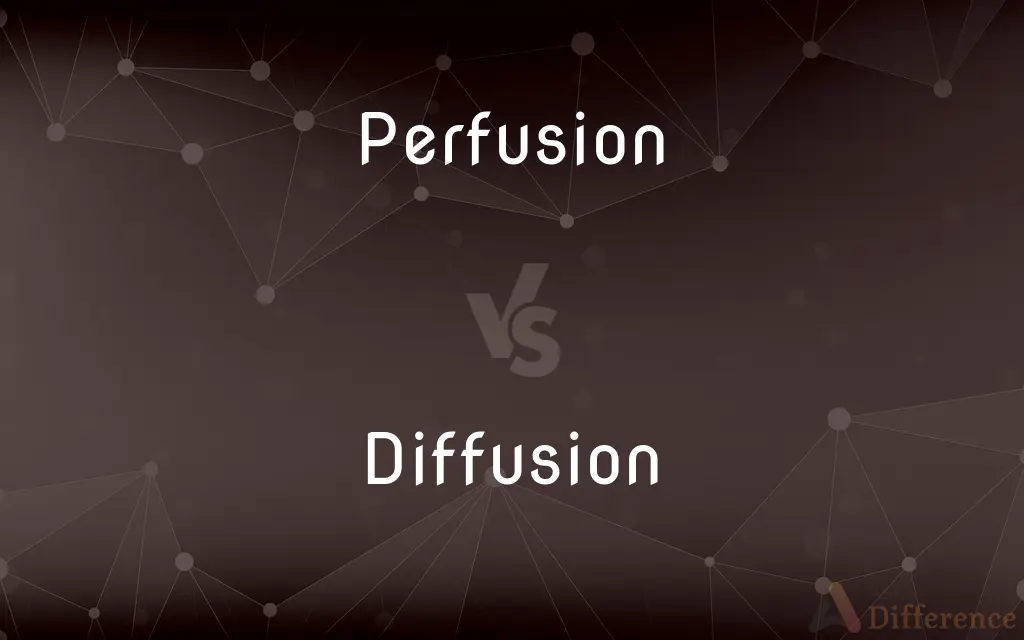Perfusion vs. Diffusion — What's the Difference?

Difference Between Perfusion and Diffusion
ADVERTISEMENT
Compare with Definitions
Perfusion
Perfusion is the passage of fluid through the circulatory system or lymphatic system to an organ or a tissue, usually referring to the delivery of blood to a capillary bed in tissue. Perfusion is measured as the rate at which blood is delivered to tissue, or volume of blood per unit time (blood flow) per unit tissue mass.
Diffusion
Diffusion is the net movement of anything (for example, atoms, ions, molecules, energy) from a region of higher concentration to a region of lower concentration. Diffusion is driven by a gradient in concentration.
Perfusion
The passage of blood, a blood substitute, or other fluid through the blood vessels or other natural channels in an organ or tissue
Decreased cerebral perfusion may cause impaired consciousness
Diffusion
The process of diffusing or the condition of being diffused
The diffusion of new technology around the world.
Perfusion
The act or an instance of perfusing.
ADVERTISEMENT
Diffusion
The scattering of incident light by reflection from a rough surface.
Perfusion
The injection of fluid into a blood vessel in order to reach an organ or tissues, usually to supply nutrients and oxygen.
Diffusion
The transmission of light through a translucent material.
Perfusion
The act of perfusing
Diffusion
The spontaneous intermingling of the particles of two or more substances as a result of random thermal motion.
Perfusion
(medicine) The introduction of a drug or nutrients through the bloodstream in order to reach an internal organ or tissues.
Diffusion
The spread of linguistic or cultural practices or innovations within a community or from one community to another.
Perfusion
The act of perfusing.
Diffusion
The act of diffusing or dispersing something, or the property of being diffused or dispersed; dispersion.
Perfusion
Pumping a liquid into an organ or tissue (especially by way of blood vessels)
Diffusion
(physics) The scattering of light by reflection from a rough surface, or by passage through a translucent medium.
Diffusion
(physics) The intermingling of the molecules of a fluid due to random thermal agitation.
Gaseous diffusion
Diffusion
The spread of cultural or linguistic practices, or social institutions, in one or more communities.
Diffusion
(marketing) The gradual spread and adoption of goods or services.
Diffusion
Exchange of airborne media between regions in space in an apparently random motion of a small scale.
Diffusion
The movement of water vapor from regions of high concentration (high water vapor pressure) toward regions of lower concentration.
Diffusion
The act of diffusing, or the state of being diffused; a spreading; extension; dissemination; circulation; dispersion.
A diffusion of knowledge which has undermined superstition.
Diffusion
The act of passing by osmosis through animal membranes, as in the distribution of poisons, gases, etc., through the body. Unlike absorption, diffusion may go on after death, that is, after the blood ceases to circulate.
Diffusion
(physics) the process of diffusing; the intermingling of molecules in gases and liquids as a result of random thermal agitation
Diffusion
The spread of social institutions (and myths and skills) from one society to another
Diffusion
The property of being diffused or dispersed
Diffusion
The act of dispersing or diffusing something;
The dispersion of the troops
The diffusion of knowledge
Share Your Discovery

Previous Comparison
Open vs. Close
Next Comparison
Semi vs. Demi















































